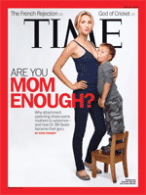Read Dr. Bill’s comments about Time Magazine’s cover and the article on him and attachment parenting.
Hello parents!
The cover was risky but a brilliant hook by Time Magazine to attract readers, and they achieved their goal. The writer, Kate Pickert, herself a new mother and one of Time’s most diligent writers, sincerely wanted to increase awareness of the Sears’ family contribution to parenting and family health. She lived with our family for two days, followed me in the office, and spent hours with me on the phone in an attempt to be factual. While the cover photo is not what I or even cover-mom Jamie would have chosen, it accomplished the magazine’s purpose. And, as some attachment dads observed, finally a magazine displays a woman’s breast for the real purpose for which they were designed – to nurture a child, not to sell cars and beer. Cover-mom Jamie is a super-nice person and highly-educated in anthropology, nutrition and theology. I enjoyed the several hours I spent with her family and her kids shined with the social effects of attachment parenting.
Even though I’m used to being misunderstood and misquoted, as is attachment parenting (AP), I had a few concerns. AP is not extreme. It’s very natural and instinctual. It’s the oldest parenting style in the world. Nor is breastfeeding three years extreme, at least throughout the world. The World Health Organization (WHO) recommends for optimal health children be breastfed for at least two years and sometimes recommends three years.
Another misconception was AP is difficult for the mother who works outside the home. It’s just the opposite. Women are the greatest multi-taskers in the world. AP, modified to the parents’ work schedule, helps busy parents reconnect with their child, which actually makes working and parenting easier. It’s attachment moms that forged the long overdue workplace-friendly breastfeeding-pumping stations and laws which respect and value the ability of a working mother to continue part-time breastfeeding.
Regarding the science criticism, it’s impossible to scientifically prove by a placebo-controlled, double-blind, randomized study (the gold standard in science) that AP works better than a more distant style of parenting. You would have to take a thousand mothers who practice AP and another thousand who don’t, and see how their kids turn out. What parent would sign up for such a study? Yet there is one long-term effect that science does agree on: The more securely-attached an infant is, the more securely independent the child becomes.
I’m disappointed the article did not pay more attention to the bottom-line of attachment parenting: how AP children turn out – and that’s where this style of parenting really shines. In my 40 years of studying the long-term effects of what parents do to help their children turn out well, AP kids generally are more: empathetic and compassionate, relate better to people, are easier to discipline, and are just nicer to be around. When I walk into an exam room in my office, an AP baby, like a little sunflower, naturally turns toward my face and lights up. I’ve yet to see an AP child be a school bully. On the contrary, they are the ones who try to comfort a hurting child.
Attachment parenting is not an all-or-nothing, extreme, or indulgent style of parenting. I advise moms and dads that the seven Baby B’s (birth bonding, breastfeeding, babywearing, bedding close to baby, belief in baby’s cries, beware of baby trainers, and balance) are starter tools (remember, tools not rules) to help parents and infants get to know each other better. And families can modify these tools to fit their individual family situation.
Over my years of mentoring attachment parents, the main two words of feedback I have heard is empowering and validating. My “helper’s high” file is filled with thank you letters such as: “Thank you, Dr. Bill, for validating what my heart and gut tell me is right.” “Thank you, Dr. Bill, for empowering us new parents with your personal experience to help us enjoy our children more.”
As an investment banker dad once told me: “AP is one of the best long-term investments you can make in giving your child a greater chance of growing up happier, healthier, and smarter.” Aren’t those the three main qualities we all want for our children?
Dr. Bill

